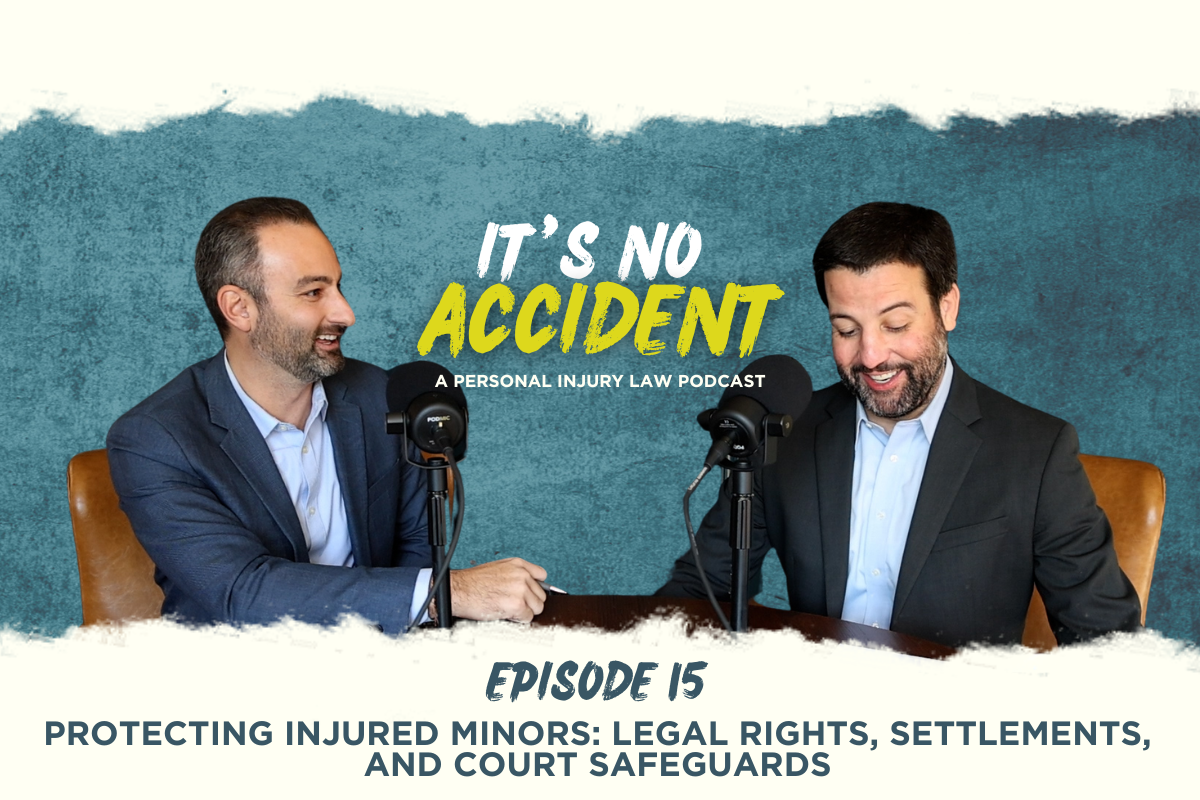
Podcast Description
In this episode of It’s No Accident, Jaeson and Mark tackle the legal hurdles families face when a child is injured due to negligence. They break down what parents or guardians need to know—from hiring an attorney to navigating settlement decisions and court approvals, especially for larger payouts that require extra legal oversight. Plus, they share how structured settlements and annuities can help secure a child’s financial future.
The duo also dives into the tricky situations that arise when divorced parents disagree on legal representation and settlements, often making an already stressful process even more complicated. They highlight key safeguards designed to protect minors and ensure they receive the compensation they deserve. Don’t miss this important conversation—listen now.
Episode Transcript
Alright, I’ve got a case right now that’s brought up some issues we thought would be good to talk about on this podcast. It has to do with what rights minors have when they’re injured in a car wreck or in any type of case involving negligence. This comes up a lot, because anyone under 18 doesn’t have the right to contract with an attorney or make decisions about settlements.
Parents in these situations often ask: What’s the process? Do we need court involvement? Do we need a guardian ad litem? Where does the money go afterward? Can you talk a little bit about how these cases start, what rights parents and minors have, and what we do when a minor is injured?
Yes, definitely. This comes up often—whether it’s a minor getting hurt in a car wreck, at a store, or elsewhere. In many ways, the case process is similar to that of an adult, but there are some important differences. As you mentioned, minors can’t hire attorneys or enter into contracts. So, the parent or guardian, whether it’s a parent or a grandparent, has the right to hire an attorney on the child’s behalf.
Often, if a mom and child are in a car wreck together, the mom will hire us to represent both herself and her child. Another big difference comes when it’s time to settle. You’re not asking the child to decide; the parent makes that call. One thing that surprises people is that if there’s a settlement, you may need court approval before finalizing it. In many cases, if the gross settlement is $15,000 or more, court approval is required.
That threshold is low, and with current ER bills, it’s not hard to hit. So, in most minor cases, court approval is needed. The court generally defers to the wishes of the guardian and the attorney. But if the gross settlement is around $25,000 to $50,000 or more, an attorney or guardian ad litem may be appointed by the court. This person reviews all settlement information, talks to the attorney, evaluates the child’s injuries and needs, and sends a report to the court either supporting or questioning the settlement.
Their job is to make sure the settlement is in the child’s best interest. Sometimes they even point out additional insurance coverage or issues that haven’t been addressed. This brings in an independent third party to assess the fairness of the deal.
The big picture here is protecting kids from potential exploitation. Most parents are good people and would never take advantage, but the law is written to protect children from bad actors. When I explain this to parents, they might initially feel insulted—like the law assumes they’ll screw over their kid—but once they understand, they usually appreciate the safeguards.
After court approval, the question becomes: Where does the money go? Does it go to the parent? Is it placed in a bank account? It depends on the amount. Regardless of the amount, the money belongs to the minor, and it can’t be used by the parent to pay for things like food, clothing, or shelter—basic needs that parents are legally obligated to provide.
If the net settlement (after attorney fees and medical bills) is $5,000 or less, the parent can manage it without court oversight. But they’re still expected to safeguard that money until the child turns 18. For larger amounts, the court may require a guardianship, where someone is appointed to manage the funds responsibly.
Guardians may have to file annual reports showing how the money was spent. In more stringent cases, the court might require that the money be placed in a locked account, where withdrawals require prior court approval. This ensures the money isn’t misused.
One of the best ways to manage these funds is by using a structured settlement or annuity. For example, if a five-year-old is awarded a six- or seven-figure settlement, placing it in an annuity allows it to grow over time. These can be set up in various ways: the child might receive annual payments through adulthood, or all of the money at age 18, or in a college fund, brokerage account, etc.
Judges almost always approve these arrangements because they lock the funds away, earn interest, and protect the child’s best interest. That way, no one can dip into the money irresponsibly.
While we haven’t personally seen it, a child who turns 18 and discovers their funds were misused could technically sue their parent. Locking the funds up removes that risk entirely. Attorneys can also be held accountable if they mishandle a minor’s settlement.
There are also complications when divorced parents disagree on how to handle the child’s case. One parent may hire us, while the other hires a different attorney. Both attorneys then have to work together to make joint decisions. It can create frustration and delays, but it’s legally allowed.
In those situations, we try to get both parents to focus on the child and put aside personal differences. That’s easier said than done—especially in contentious divorces. Sometimes the divorce issues themselves come up in the case and distract from the goal of helping the child.
Additionally, fee-splitting between attorneys can become an issue. Since there’s only one settlement and one contingency fee, attorneys may argue over how it gets divided. One might claim they did more litigation work; another, more prep work. These disputes can delay the case and add unnecessary tension.
Fortunately, in most of our cases, we’ve been able to work out fee splits amicably. But when attorneys fight over money in front of a judge or jury, nobody’s sympathetic. It’s always better to mediate and resolve those issues beforehand.


